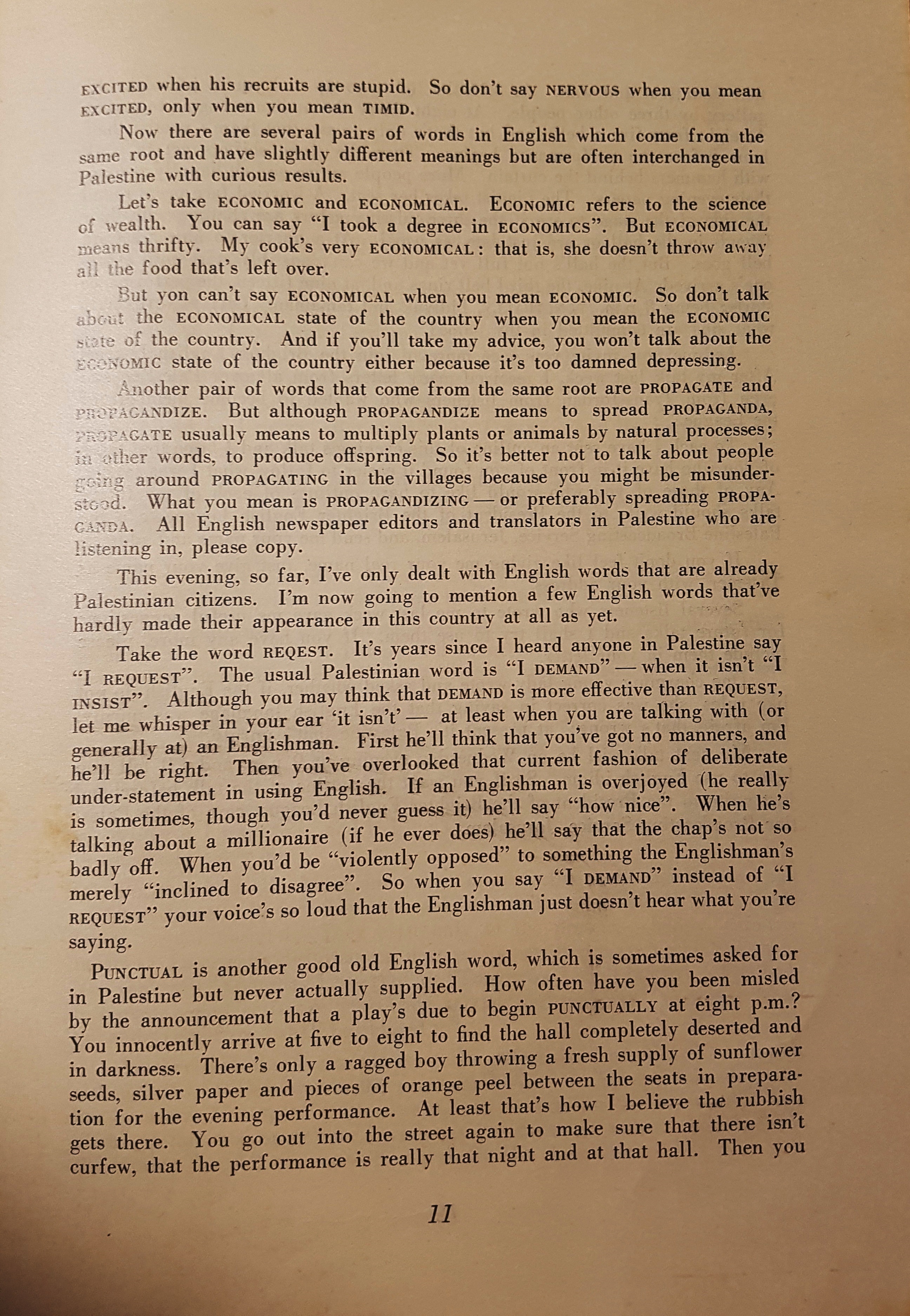|
Let's Speak English
| Contents | Previous Page | Next Page | - Page 11 - EXCITED when his recruits are stupid. So don't say NERVOUS when you mean EXCITED, only when you mean TIMID. Now there are several pairs of words in English which come from the same root and have slightly different meanings but are often interchanged in Palestine with curious results. Let's take ECONOMIC and ECONOMICAL. ECONOMIC refers to the science of wealth. You can say " I took a degree in ECONOMICS". But ECONOMICAL means thrifty. My cook's very ECONOMICAL: that is, she doesn't throw away all the food that's left over. But you can't say ECONOMICAL when you mean ECONOMIC. So don't talk about the ECONOMICAL state of the country when you mean the ECONOMIC state of the country. And if you'll take my advice, you won't talk about the ECONOMIC state of the country either because it is too damned depressing. Another pair of words that come from the same root are PROPAGATE and PROPAGANDIZE. But although PROPAGANDIZE means to spead PROPAGANDA, PROPAGATE usually means to multiply plants or animals by natural processes; in other words, to produce offspring. So it's better not to talk about people going around PROPAGATING in the villages because you might be misunderstood. What you mean is PROPAGANIZING - or preferably spreading PROPAGANDA. All English newspapers editors and translators in Palestine who are listening in, please copy. This evening, so far, I've only dealt with English words that are already Palestinian citizens. I'm now going to mention a few English words that've hardly made their appearance in this country at all as yet. Take the word REQUEST. It's years since I heard anyone in Palestine say "I REQUEST". The usual Palestinian word is "I DEMAND" - when it isn't "I INSIST". Although you may think that DEMAND is more effective than REQUEST, let me whisper in your ear 'it isn't' - at least when you are talking with (or generally at) an Englishman. First he'll think that you've got no manners, and he'll be right. Then you've overlooked that current fashion of deliberate under-statement in using English. If an Englishman is overjoyed (he really is sometimes, though you'd never guess it) he'll say "how nice". When he's talking about a millionaire (if he ever does) he'll say that the chap's not so badly off. When you'd he "violently opposed" to something the Englishman's merely "inclined to disagree". So when you say "I DEMAND" instead of "I REQUEST" your voice's so loud that the Englishman just doesn't hear what you're saying. PUNCTUAL is another good old English word, which is sometimes asked for in Palestine but never actually supplied. How often have you been misled by the announcement that a play's due to begin PUNCTUALLY at eight p.m.? You innocently arrive at five to eight to find the hall completely deserted and in darkness. There's only a ragged boy throwing a fresh supply of sunflower seeds, silver paper and pieces of orange peel between the seats in preparation for the evening performance. At least that's how I believe the rubbish gets there. You go out into the street again to make sure that there isn't curfew, that the performance is really that night and at that hall. Then you 11 |

|
|
| Contents | Previous Page | Next Page |